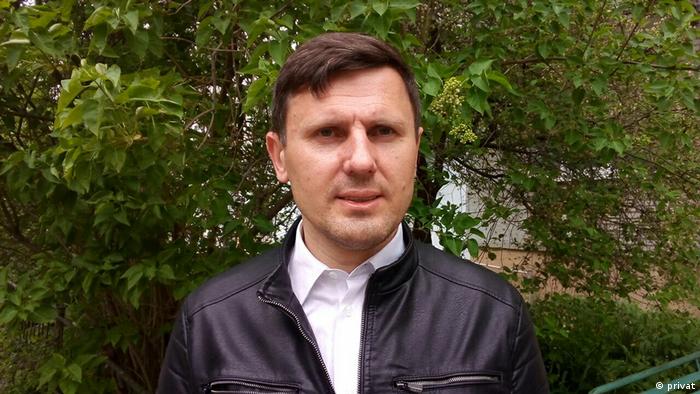DW's Belarus correspondent released after 10-day arrest
Alexander Burakov has been released after spending 10 days in detention. He told DW his arrest was linked to the authorities' efforts to hinder independent journalists from covering the presidential election.

Freelance journalist Alexander Burakov, who reports for DW's Russian service, was released from detention late Saturday evening after being held for 10 days. Speaking to DW shortly after his release, Burakov said he was doing fine. He said he had no idea about what was going on in the country in the aftermath of last Sunday's presidential election, since he had no access to any information in prison.
"The radio in my cell was switched off, so I was in a total information vacuum. I just got to know that people had died during the protests. I am shocked," he said.
Read more: DW correspondent arrested in Belarus
Burakov said he didn't have any complaints about how the police officers had treated him in the detention. However, he called his arrest "a farce," saying it was part of the authorities' effort to prevent independent journalists from reporting about the presidential election, which took place on August 9.
Mass protests broke out in major cities across Belarus last week after longtime President Alexander Lukashenko secured a sixth consecutive term following an election that the opposition said was rigged.
Why was Burakov arrested?
Burakov was first arrested on August 5 by police in his hometown Mogilyov, 200 kilometers (120 miles) east of the Belarusian capital, Minsk. The police suspected him of "transporting counterfeit alcohol," he told DW. After they didn't find anything illegal in the car, the officers alleged that the vehicle, which he has owned since 2013, had been stolen and the car's identification number was fake. As a result, the journalist was taken to the local police station.
A few hours later, Burakov was released, only to be arrested again outside the police station. Burakov said an unknown woman approached him after he left the police station. "I didn't even see her face and didn't know what was happening," the journalist said, adding that the police officers showed up and took him back to the station. The woman later told police that Burakov had cursed and pushed her, he said.
On August 7, the court sent Burakov to a detention facility on charges of petty hooliganism. The journalist denied the allegations.
DW Director General Peter Limbourg protested against the sentence, saying the reasons for Burakov's arrest and conviction provided by the authorities "can only be interpreted as a flimsy excuse to hinder critical and independent journalism a few days before the presidential elections in Belarus."
"On behalf of Deutsche Welle, I protest firmly and in the strongest terms against this obviously arbitrary state action. It blatantly disregards the internationally guaranteed freedom of the press," Limbourg said in a statement issued on August 7. He also demanded that the government in Belarus immediately investigate this case.
Earlier this year, on May 8, Burakov was arrested for participating in an unsanctioned demonstration. The journalist said he didn't take part in the protest and was only there as a journalist and a human rights activist.
Read more: German Foreign Minister Maas vows to ramp up pressure on Belarus
Crackdown on independent journalists
Burakov is one of the several journalists targeted by Belarusian authorities in the past few weeks. Dozens of foreign and local journalists have been arrested during protests that broke out after the controversial election. According to the Belarusian Association of Journalists, about 70 journalists have been detained during the protests against Lukashenko.
Many Belarusian journalists have reportedly quit their jobs at state media outlets in the past few days, with many condemning the police violence against protesters on social media.
Read more: Arrested protesters talk of brutality
Reporters Without Borders said it was "highly alarmed about the numerous arrests of journalists in Belarus after the presidential election." According to a statement released by the media watchdog on Friday, journalists were arbitrarily detained, beaten up and jailed for a longe period of time.
"Such an attack on the free press, particularly in a European country, is absolutely unacceptable," said Michael Rediske, a spokesman for the organization's board. "If the attacks don't stop immediately, the European Union should think about further measures and, for instance, impose sanctions against those politically responsible in Belarus."
Foreign ministers of the European Union countries agreed on Friday to impose new sanctions targeting Belarusian officials responsible for the violent crackdown on demonstrators and journalists.
No comments:
Post a Comment